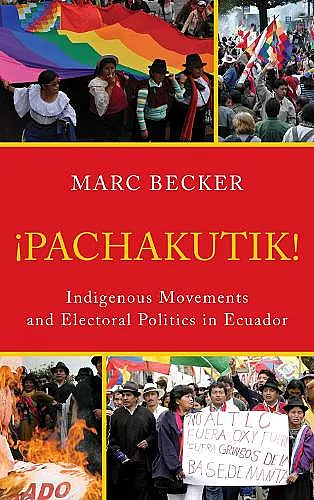Pachakutik
Indigenous Movements and Electoral Politics in Ecuador
Format:Hardback
Publisher:Rowman & Littlefield
Published:16th Dec '10
Currently unavailable, and unfortunately no date known when it will be back
This hardback is available in another edition too:
- Paperback£41.00(9781442207547)

This authoritative book provides a deeply informed overview of one of the most dynamic social movements in Latin America. Focusing on contemporary Indigenous movements in Ecuador, leading scholar Marc Becker traces the growing influence of the Confederation of Indigenous Nationalities of Ecuador (CONAIE), which in 1990 led a powerful uprising that dramatically placed a struggle for Indigenous rights at the center of public consciousness. Activists began to refer to this uprising as a "pachakutik," a Kichwa word that means change, rebirth, and transformation, both in the sense of a return in time and the coming of a new era. Five years later, proponents launched a new political movement called Pachakutik to compete for elected office. In 2006, Ecuadorians elected Rafael Correa, who many saw as emblematic of the new Latin American left, to the presidency of the country. Even though CONAIE, Pachakutik, and Correa shared similar concerns for social justice, they soon came into conflict with each other. Becker examines the competing strategies and philosophies that emerge when social movements and political parties embrace comparable visions but follow different paths to realize their objectives. In exploring the multiple and conflictive strategies that Indigenous movements have followed over the past twenty years, he definitively documents the recent history and charts the trajectory of one of the Americas' most powerful and best organized social movements.
This is a terrific book! Beyond an excellent account of Ecuador’s recent political history, Becker provides us with the history of a paradox: how the strongest Indigenous movement in the Americas found itself in campaigns and alliances that served to limit and undermine its political influence. Ideal for courses on Latin American politics and social movements, this book offers a provocative cautionary tale about the dangers of social movement success. -- José Antonio Lucero, University of Washington
Pachakutik, a Quechua Indian term that signifies rebirth and transformation, depicts the struggle of Ecuador's Indigenous movement for equal rights and justice. Becker (Truman State Univ.) writes as an activist who helped the Indigenous movement establish an Internet base and participated in many of the activities he describes. He discusses the political awakening of Indigenous forces in 1990 and their ensuing massive demonstrations in reaction to deepening poverty aggravated by the government's neoliberal economic policies that privatized public resources and functions. Actions such as the blocking of highways put pressure on Ecuadoran governments to change policies, helped bring about the overthrow of two presidents, and compelled presidents to address issues presented by the Indigenous movement. However, tangible benefits to indigenous communities were quite limited. The pachakutik movement also became engaged in electoral politics, with some success in local, regional, and national elections and the gaining of a few government cabinet positions. However, disunity among Indigenous forces and the influence of powerful national and international economic interests limited indigenous gains, leading to disillusionment and the recent decline in the political influence of the indigenous community. Recommended. Upper-division undergraduate, graduate, and research collections. * CHOICE *
Becker's rendering of contemporary Ecuadorian politics, Indigenous organizing, and social movements is superb and reflects an insider's knowledge of this country. Moreover, his treatment of the challenges that organizations face when transitioning from social movements to electoral politics makes this book not only ideal for classroom use but also essential reading for those wishing to gain a greater understanding of the recent grassroots democratization campaigns that have reverberated throughout the world. -- Kenneth Kincaid, Purdue University North Central
Becker gives us a vocabulary and an analytic framework with which to track the efforts of Ecuador’s Indigenous movement to resume the role of protagonist and transform Ecuador into a place where its peoples live not just better but well. * Latin American Perspectives *
ISBN: 9781442207530
Dimensions: 240mm x 162mm x 23mm
Weight: 506g
262 pages